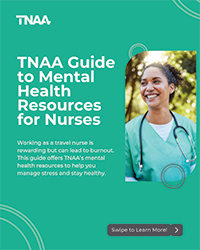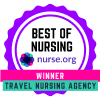Tips and Resources to Prevent Nurse Burnout and Overcome Stress
Working as a travel nurse or healthcare traveler is a fulfilling career filled with many perks. You make a meaningful impact on your patients’ lives, you get to discover new destinations, you build your clinical skills – and that’s just for starters! However, healthcare travelers are not immune to the effects of burnout.
May is Mental Health Awareness Month, and although it’s important to be checking in on your mental health regularly (it’s just as important as your physical health!), this month serves as a good reminder to focus on the impact your mental health plays in your overall well-being.
We’ve compiled a list of stress management tips and mental health resources available to TNAA travelers.
Understanding Healthcare Burnout
The demands of a career in healthcare can take a toll, and many healthcare professionals experience burnout. In fact, a 2023 survey conducted by the American Nurses Foundation and McKinsey found that 56% of nurses have symptoms of burnout, while the Centers for Disease Control and Prevention reports burnout across 45% of the entire healthcare workforce, an increase of over 32% since 2018.
The first step to combating burnout and other mental health issues is to understand it. Feelings of burnout can vary from person to person, with multiple factors contributing to the underlying cause. Therefore, it’s important for travel nurses to know what the symptoms of burnout are so you can recognize it in yourself and others.

Signs of Nurse Burnout
- Fatigue
- Dread or panic about work
- Feeling overworked
- Feeling underappreciated
- Insomnia or trouble sleeping
- Feelings of anxiety or depression
- Tension
- Apathy
These are some of the most common signs you may be experiencing nurse burnout, but you could have other symptoms, so be sure to check in on yourself and learn to recognize what burnout feels like to you.
Tips to Prevent and Overcome Nurse Burnout
Prioritize Sleep and Rest
Getting a proper night’s rest is imperative to your mental health. In fact, lack of adequate sleep is associated with a higher risk of nurse burnout. Make sure you get 8+ hours of sleep each day so you can feel properly rested.
Resting without sleep is equally important. You need a break from the mental load you feel at work. Taking time to practice mindfulness during your day and week and allowing yourself time to fully relax can help. Whether you are into yoga, meditation, or journaling, find an activity that will help you channel your attention to something more calming. Be aware that you might have to try a few options (maybe even multiple times) to see what brings you the most peace, but don’t give up.
Mental Health and Mindfulness Apps
One way to help yourself relax is through mindfulness or meditation. Several apps offer guided practices, and many are only 10-15 minutes long, making them easier to fit into your busy, adventurous schedule.
An app nurses can access for free is Happy. As part of the Well-Being Initiative, they partnered with the American Nurses Association to assist nurses free of charge. To get in touch with a mental health professional, nurses can download the app, call (833) 327-0262, or text their first name and ANA to (858) 367-3001.
Other apps like Calm, Headspace, and others offer guided programs to help you with sleep, stress and anxiety, and practicing mindfulness.
Scale Back
Identify what is causing you stress outside of work and think of ways to scale it back. If you feel you never have time to yourself, see where you can cut out some activities or chores (thank you, grocery delivery services). Turn off the news and take a break from social media if these are adding to your mental load. By clearing some of these activities from your schedule, you allow yourself time to do things that bring you greater joy.
Scaling back at work can be a bit more tricky, but it’s not impossible. Consider taking a longer break between your next assignment or forgoing extra shifts until you feel ready to take them on again. Remember: traveling offers a lot of flexibility, so make it work for you!
Create Focus Blocks
A focus block is a time you set aside most days of the week to dedicate attention to your more important tasks. Focus blocks can help you accomplish things that need to be done but might seem looming. By setting aside a specific amount of time in your schedule and solely focusing on one task, you will free up your other time for things you enjoy!
One way to utilize focus blocks is to help you prepare for your next assignment. As a traveler, you’re likely moving every few months, and moving comes with a list of chores to complete. Use focus blocks to give yourself plenty of time to prepare for a move and limit any stress that can mount when you are short on time.
Build Your Community of Support
You might not be near your friends and family, but you still have a team of people cheering you on and thinking of you, including us here at TNAA. Schedule in regular time to catch up with your loved ones via a phone or video call. There are several online groups created specifically for traveling healthcare professionals that you can join to find refuge, support, and humor on a troubling day.
Explore Your City
Many travelers embark on a career in travel to see the country. Take advantage of the opportunities your career provides. Get to know your area by taking a hike, seeing the sites, or trying a new restaurant. Stepping outside of workplace stress and into a more normal setting can improve your mood.
Seek Professional Help
At TNAA, we want you to know you have access to help. Seeking help is one of the bravest things you can do and puts you on the road to recovery that much quicker. It doesn’t matter if you have insurance through TNAA or not – we can connect you (and your loved ones) with mental well-being resources. See some of your options below.
TNAA’s Mental Wellbeing Resources for Nurse Burnout

Employee Assistance Program
TNAA’s Employee Assistance Program (EAP) is entirely free for all of our travelers and isn’t tied to our insurance plans. In fact, anyone in your household you consider close to you – a spouse, child, sibling, parent, or best friend – can get help through the EAP. Our EAP offers six free therapy sessions per event per year. That means that even if you experience multiple events per year, you have access to care. After the six sessions are finished, the EAP can refer you to a professional covered by your insurance. Learn more about the services offered through TNAA’s EAP here.
Cigna Resources
Travelers who are on TNAA’s insurance plan can access several mental well-being resources through Cigna.
- MDLIVE – Counselors or psychiatrists available for non-emergency conditions.
- Cigna’s Behavioral Health Network – Video-based counseling through Cigna’s network of providers.
- Talkspace – Licensed therapy accessed through the Talkspace app.
- Lifestyle Management Programs – Personalized support from a Cigna health coach for stress management and more.
- Happify – Science-based games and activities on a resilience and stress reduction app.
- iPrevail – On-demand peer coaching and personalized cognitive behavioral therapy.
- Your Health First – Personalized support from a Cigna health coach for anxiety, depression, and bipolar disorder.
- Behavioral Health Awareness Seminars – Monthly seminars on a variety of issues.
 Get the Guide
Get the Guide
Download the TNAA Guide to Mental Health Resources for Nurses for resources and tips on the go.
Caring for yourself is the most important thing you can do to ensure you are fully available to provide the best care for your patients. If you’d like to look over all of your options, you can learn more about TNAA’s traveler benefits here. You can reach out to your recruiter or benefits specialist at any time to access helpful information regarding TNAA’s mental well-being resources.







